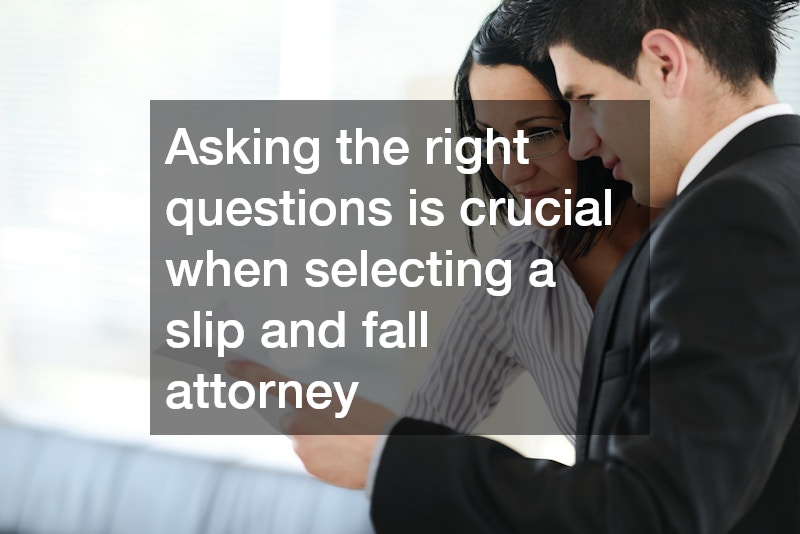
Slip and fall accidents can be both physically and financially debilitating, often leading individuals to seek the guidance of skilled attorneys. Understanding the right questions to ask can significantly impact the outcome of any legal representation. This article delves into the critical inquiries you should consider when consulting a slip and fall attorney.
How Experienced Are You in Slip and Fall Cases?
Assessing Attorney’s Specialized Experience
Determining slip and fall attorneys‘ specialized experience in slip and fall cases begins with evaluating their case history. Look for attorneys who have successfully navigated similar cases, showcasing their understanding and command of slip and fall laws.
An experienced attorney often brings nuanced strategies that can make a marked difference in the case outcome.
Experience in slip and fall cases encompasses knowledge of relevant statutes, defenses, and claims. This specialization can directly correlate with the attorney’s ability to anticipate challenges and prepare adequately for them. Attorneys adept in this area ensure that your claim is presented compellingly, potentially increasing your likelihood of winning a favorable settlement.
Understanding the Types of Cases Handled
Slip and fall cases can vary significantly depending on the circumstances surrounding the accident. Differentiating between cases that occur on commercial properties versus residential settings can impact the legal approach and strategy. An attorney familiar with a wide array of slip and fall scenarios can adeptly tailor their tactics to suit the specific circumstances of your claim.
Attorneys with experience across diverse case types can better navigate the intricacies involved in premises liability law. Whether it involves defective walkways, slippery floors, or inadequate lighting, knowing the particulars of how these hazards are treated in court is crucial. By addressing these specific case types, attorneys can develop more focused strategies for successful outcomes.
Examining the Attorney’s Track Record
Investigating an attorney’s track record involves delving into their success rate with similar cases. By analyzing their past courtroom victories and settlements, you can make an informed judgment about their capability to handle your case. A noteworthy track record indicates a history of effective case management and strong advocacy.
Each case an attorney represents contributes to their overall standing and credibility, especially in slip and fall cases. A solid track record not only brings confidence but often serves as leverage during negotiations with insurance companies. Attorneys accustomed to success often employ tried-and-tested approaches, continuously refining their tactics to align with evolving legal standards.
What is Your Fee Structure?
Contingency Fees and Their Importance
Contingency fees are a common payment method in personal injury cases, including slip and fall incidents. This fee structure means that legal fees are only paid if the attorney achieves a settlement or court victory for the client. Many victims find this method advantageous, as it allows them to pursue justice without upfront legal costs, particularly when finances are already stretched from accident-related losses.
While contingency fees provide flexibility, they also ensure that the attorney is motivated to secure the best possible result. It’s crucial to understand what percentage of the settlement will be allocated to legal fees and if this changes depending on whether the case goes to court. Such transparency helps you evaluate the financial impact of hiring an attorney on a contingency basis.
Understanding Additional Costs
In addition to contingency fees, you should be aware of any supplementary expenses your case might incur. These can include costs for court filings, evidence gathering, and potential expert witness fees, which your attorney should outline clearly at the start. Understanding the full scope of potential costs helps prevent surprises and prepares you for the financial commitments involved.
Clarifying Billing Procedures
Alongside understanding fees, gaining clarity on billing procedures is imperative to maintain transparency and trust. Familiarize yourself with how the attorney will document and itemize all case-related expenses. This knowledge not only fosters confidence in your financial dealings but also ensures you can keep track of everything throughout the legal process.
What is the Expected Timeline for My Case?
Basic Case Process Overview
A slip and fall case typically follows several key stages, starting with the initial consultation and investigation. Once evidence is gathered, the case proceeds to the filing of a complaint, discovery, potential settlement negotiations, and possibly a trial. This roadmap provides a general framework, but understanding specific timelines can better prepare you for your legal journey.
Factors Affecting Case Duration
Various factors can influence how long a slip and fall case might take to resolve, including the complexity of the incident. Cases with extensive injury or disputes over liability may naturally demand more investigation and negotiation timeframes. Recognizing these elements enables you to adjust your expectations regarding the case’s duration.
Strategies for Accelerating Resolutions
Your attorney might employ several strategies to expedite your case, tapping into their experience with similar slip and fall claims. One approach involves proactive communication with all parties involved, ensuring the timely submission of necessary documentation. Remaining organized and diligent in gathering evidence facilitates smoother and faster progress.
Asking the right questions is crucial when selecting a slip and fall attorney. A well-informed decision can enhance your legal strategy and, ultimately, the compensation you seek. Ensure a deliberative choice by keeping these pivotal inquiries top of mind.
.

